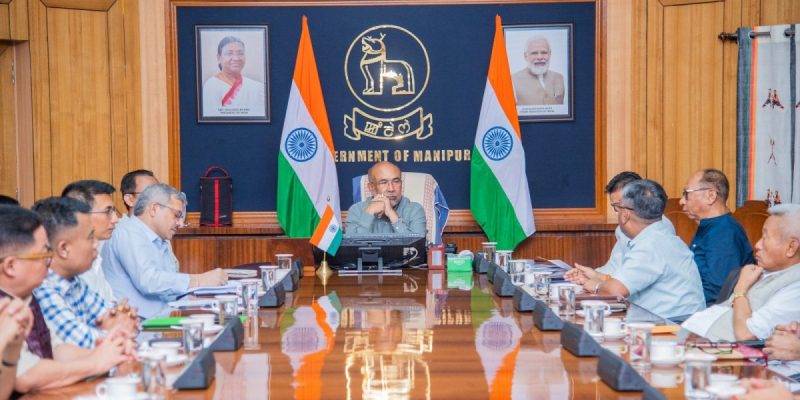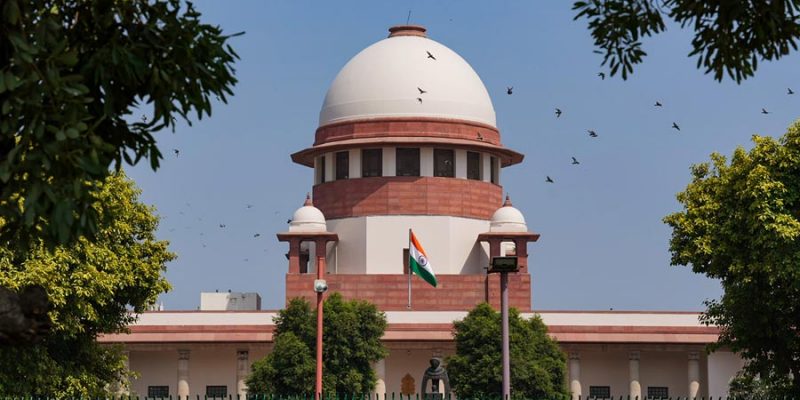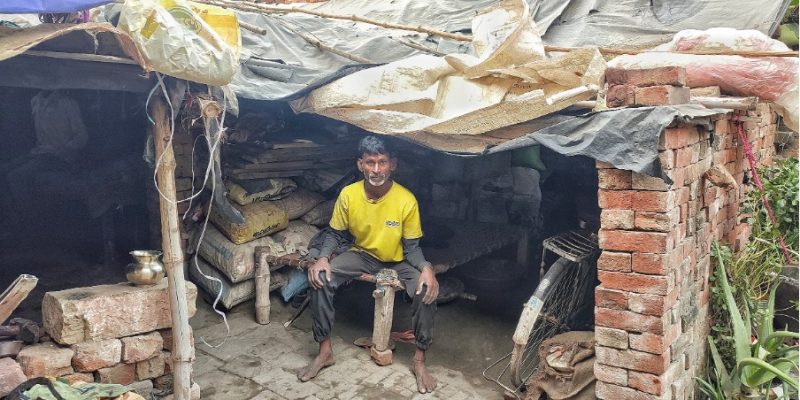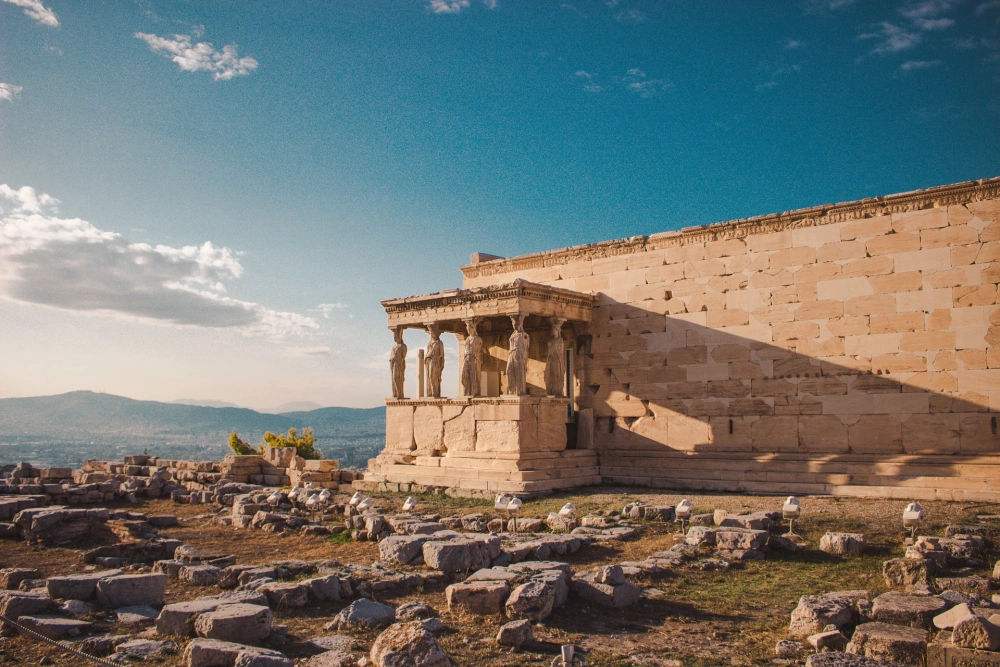Madhavsinh Solanki Won 149 Seats in Gujarat in 1985. Here’s Why Modi Has to Break This Record
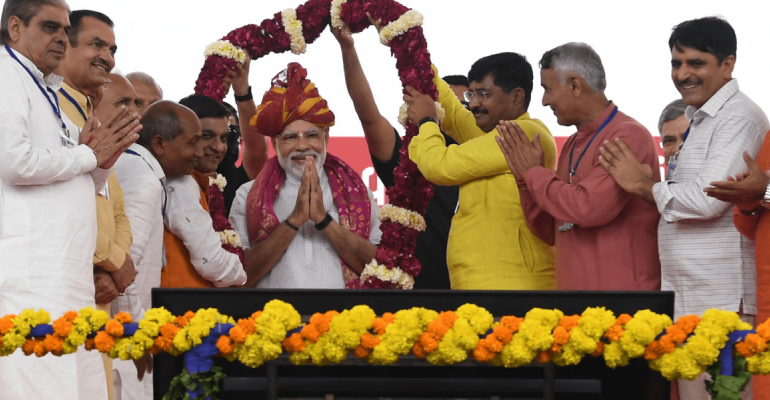
Experience and prudence caution us against believing politicians when they claim to tell the truth. This precaution becomes particularly imperative during an election season. But an exception needs to be made in the present case of Prime Minister Narendra Modi.
Last Sunday, when he kicked off the Bharatiya Janata Party’s Gujarat campaign in Valsad, he shouted and made his audience shout a number of times: “I have made this Gujarat.” A clever slogan laden with double meaning.
 No one in the Valsad audience or beyond was in any kind of doubt that the “I” in the slogan refers to one and only one person: Narendra Modi.
No one in the Valsad audience or beyond was in any kind of doubt that the “I” in the slogan refers to one and only one person: Narendra Modi.
Like a village moneylender, the prime minister has returned, at harvest time, pressing his claim to compensation and respect from an electorate who should be naturally and unconditionally grateful to him for having created a new and “vibrant” Gujarat.
Modi seems to be proclaiming: “I have remade Gujarat, redefined its politics, realigned caste and religious fault lines, reconfigured its impulses, fears, aspirations and memories. Gujarat is my creation and it belongs to me.” An elephantine ego gone rogue.
As expected, the Gujarat BJP promptly declared “I have made this Gujarat” to be its electoral theme song for the 2022 battle. A new anthem of megalomania.
The prime minister’s exertions in Gujarat, before and after the model code of conduct came into effect, are baffling. There is no way the BJP can lose the 2022 assembly elections. BJP’s election managers could possibly have a cause for worry only if a genuinely free and fair election would have been feasible; such a pious hope is totally unrealistic.
Indeed, it is possible to suggest that the BJP has already cornered every feasible advantage, legitimate as well as illegitimate. The Election Commission no longer pretends to be a neutral third umpire.
In the run up to the elections, a number of sects and katha-vachaks (narrators) – a kind of a proxy campaign – have been allowed to deepen religious sentiments. The Gujarat police hierarchy, especially in the big cities, is understood to be quite happy and untroubled in going along with the local BJP dadas to ensure that Muslims do not get to vote. Also, the returning officers can be relied upon to peremptorily give the ruling party a break in close contests on counting day; those pesky election petitions can be dealt with at a later day.
Also read: The Irrelevance of Muslims in Gujarat Elections
Then, pray, why should the prime minister go into a nervous overdrive?
After all, the electoral equation is heavily tilted in the BJP’s favour.
The BJP enjoys a ten-to-one edge over its rivals in terms of money, muscle power, organisational clout and a stranglehold over local influencers. The Congress, on the other hand, is rudderless; its so-called leaders are, as is their wont, a squabbling lot and are unwilling to put aside their petty rivalries in the interest of defeating the BJP.
And, in any case, it appears that every other Congress leader is only too eager to join the BJP – and the BJP seems equally eager and anxious to celebrate any and all desertions from the Congress’s ranks. In more than one way, the Congress appears to have been squeezed out of Gujarat’s political landscape.
The new kid on the block, the Aam Aadmi Party, led by Arvind Kejriwal, is seeking to present an alternative but is clearly handicapped by the absence of any organisational muscle and network. If anything, from a BJP strategist’s perspective, the AAP campaign can only eat into the Congress’s vote share. Many surveys also hint at this ‘vote-katva’ (vote-cutter) role. And, not to be left behind, that gentleman from Hyderabad, Asaduddin Owaisi, is also threatening to nibble away at the Congress’s vote bank.
So again, we must ask, why this nervousness?
Perhaps the prime minister and his coterie know that the only possible opposition that the BJP could face can come from the electorate itself – wiser to Modi’s tricks of keeping them trapped in his corner. After more than 20 years of unchallenged and unqualified hold over the levers of power, from the Gandhinagar secretariat down to the taluka-level revenue official, the BJP is no longer able to apportion blame on to others for its indifferent governance and exquisitely amoral politics.
Could it be that the BJP strategists can smell an incipient “Modi fatigue”? For Gujaratis, this time has not so far shown the kind of excitement and eagerness of the past whenever Modi had come asking for votes.
The oldest trick – a Hindu-Muslim confrontation – has not clicked. Muslims, by and large, have remained unprovoked despite some deliberate prodding and probing. Now there will not even be an India-Pakistan T20 final, which could possibly be an alibi for instigating communal trouble. Of course, the judiciary could still pronounce a verdict in the Bilkis Bano convicts’ remission of sentence matter before the 2022 vote, thereby re-kindling memories of 2002 that the BJP could try to use to polarise the electorate.
Also read: How Gujarat 2002 Turned India Into a Nation of Pathological Liars
The BJP has already gamed the caste equations in Gujarat, as everywhere else. But juggling caste ambition and resentment becomes counter-productive at some point. And now, with the new quota for the poor, the caste card has become exceedingly tedious.
Ironically, Modi’s success at the national level has deprived the BJP of one of its most efficacious tricks: invocation of a hostile (Nehruvian) Centre, out to do the Gujaratis of their self-respect, dignity, autonomy and prosperity. If anything, the boot is now on the other foot. It is the prime minister and the Union home minister who are widely – and, correctly—perceived to be micromanaging the affairs of Gujarat from distant Delhi. The state’s chief ministers do not even have the luxury of complaining at being reduced to glorified section-officers, dutifully carrying out “orders from above”.
The BJP brass is confronted with a harsh reality: nearly 40% of the Gujarat voters have come of age after the defining 2002 anti-Muslim violence. For this segment of the majority population, the Muslims have already been ‘shown their place’. Thanks to the “Hindu Hriday Samrat” (monarch of the Hindu heart), that battle is won and done with.
This new “aspirational” segment wants jobs, meaningful employment, good governance, ease of living and the space for individual dreams. And, these new voters take with more than a pinch of salt all this talk of India striding confidently on the global stage under the inspired leadership of new vishwagurus.
Unlike the vastly over-impressed ‘strategic community’ and the permanently over-awed ‘national media’, the new voter has to live every day with the prosaic realities of the now old ‘new Gujarat’. They know Modi is seeking a mandate for a model of institutionalised lumpen governance.
Perhaps this explains the prime minister’s conjuring up of Gujarat’s “enemies”– a veiled reference to AAP – who are out to give the state a bad name. In the process, the prime minister is seeking a reaffirmation of all that he has ‘achieved’ in and for Gujarat – the good, the bad and the Morbi.
Yet, being a man who is so conscious of rewriting history, it must rankle Modi that he has not been able to come anywhere near Madhavsinh Solanki’s 1985 record of winning 149 assembly seats. This is perhaps his last chance. If the BJP fails to cross the Solanki line, it would be read – way beyond Gujarat – as a sign that the old lion is a fading king of the jungle that is naya Bharat.


